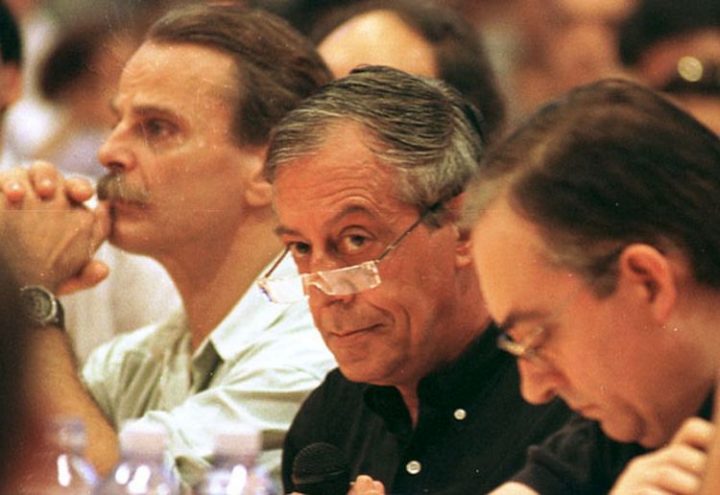On January 4, 1998, 21 years ago, at the Palacio de Deportes de “Obras Sanitarias” in the city of Buenos Aires, Argentina, Silo concluded his final report to the first Public Assembly of the Structure of the Humanist Movement with these few words:
“…What is the humanist movement today? Is it perhaps a refuge in the face of the general crisis of the system in which we live? Is it a sustained critique of a world that is becoming more dehumanized day by day? Is it a new language and a new paradigm, a new interpretation of the world and a new landscape? Does it represent an ideological or political current, a new aesthetic, a new scale of values? Is it a new spirituality, destined to redeem subjectivity and diversity through concrete action? Is the Movement perhaps the expression of the struggle in support of the dispossessed, the abandoned, and the persecuted? Or is it a manifestation of those who feel the monstrosity inherent in human beings not having the same rights and the same opportunities?
The Movement is all that and much more. It is the practical expression of the ideal of humanizing the Earth and the aspiration of moving towards a Universal Human Nation. It is the seed of a new culture in this civilization that is becoming planetary, and which will have to change its course, accepting and valuing diversity and giving equal rights and identical opportunities to all human beings, because of the dignity that they deserve by the simple fact of their having been born.
The Humanist Movement is the external manifestation of the profound changes that are taking place in the interior of the human being and that are history itself: tragic, disconcerting, but always growing. It is a small voice, which foretells what is to come beyond the human being we have known. It is a poem and a rainbow of diverse colors. It is a David facing an insolent Goliath. It is the softness of water against the hardness of rock. It is the strength of the weak: a paradox and a Destiny.
My friends, even when we do not immediately achieve the results that we have hoped for, this seed exists already, and awaits the arrival of the times that are to come.
For all, from heart to heart, the fervent desire for this coming social change and the hope for this silent transformation which, beyond all compulsion, beyond all impatience, beyond all violent aspiration, beyond all guilt and all feelings of failure, is already nesting in the intimate depths of many humanists.”
This speech (the video and other explanations can be found on the official page of the Humanist Movement) strangely does not appear in the complete works nor in the site where the author himself has left all his work written, recorded in audio or video.
I was there in person, in the simultaneous translation booth where I translated the entire meeting, the volunteer service work that I had to do in these meetings and translating that text at the end of a long day of work was an experience that I still remember with great intensity.
Perhaps it is because of this anecdote that I remember well that little speech in which Silo manages not only to sum up some important things for humanists, but also to express them with an extraordinary poem: “the softness of water against the hardness of the rock, the strength of the weak”.
But the theme of what the Humanist Movement is today continues to be an open theme. Once we said: the Movement is an instrument to achieve a better world and will cease to exist when that world is realized. If that is so and one looks at the world, it is clear that the Humanist Movement is something absolutely necessary in a world where unexpected signs of growing dehumanisation appear.
Some have confused the Movement for too long with the different forms of organisation it has taken according to the historical moment; also wanted to identify the Humanist Movement with that Humanist Movement that Silo himself defines more precisely as Universalist Humanism and that is the variant of humanism he formed, but not the only one that exists.
For example, the name New Humanism is currently found in very diverse ideological, spiritual and academic fields and sometimes even with opposing points of view: this simply highlights the fact that concern for the Human Being is felt very much by vast layers of society, which cannot please all humanists.
The synthetic and poetic definition that Silo proposes in this speech is, in my opinion, extremely current at this moment when the worst syllogisms serve to intellectually justify the worst filth of this semantic banditry that Noam Chomsky remembers well; Today more than ever, we need to throw our hearts beyond the obstacle and affirm the battle of “David against the insolent Goliath”, the battle of values against pragmatism, of the human against the law of statistical numbers, the force of utopia against the prevailing realism, possibility instead of resignation.
But, above all, to do all this we must remember and apply the Document of the Humanist Movement when it says: “But a wall has arisen between humanist aspirations and the realities of today’s world. The time has come to tear down that wall. To do this, all humanists of the world must unite.”
Translated by Pressenza London






